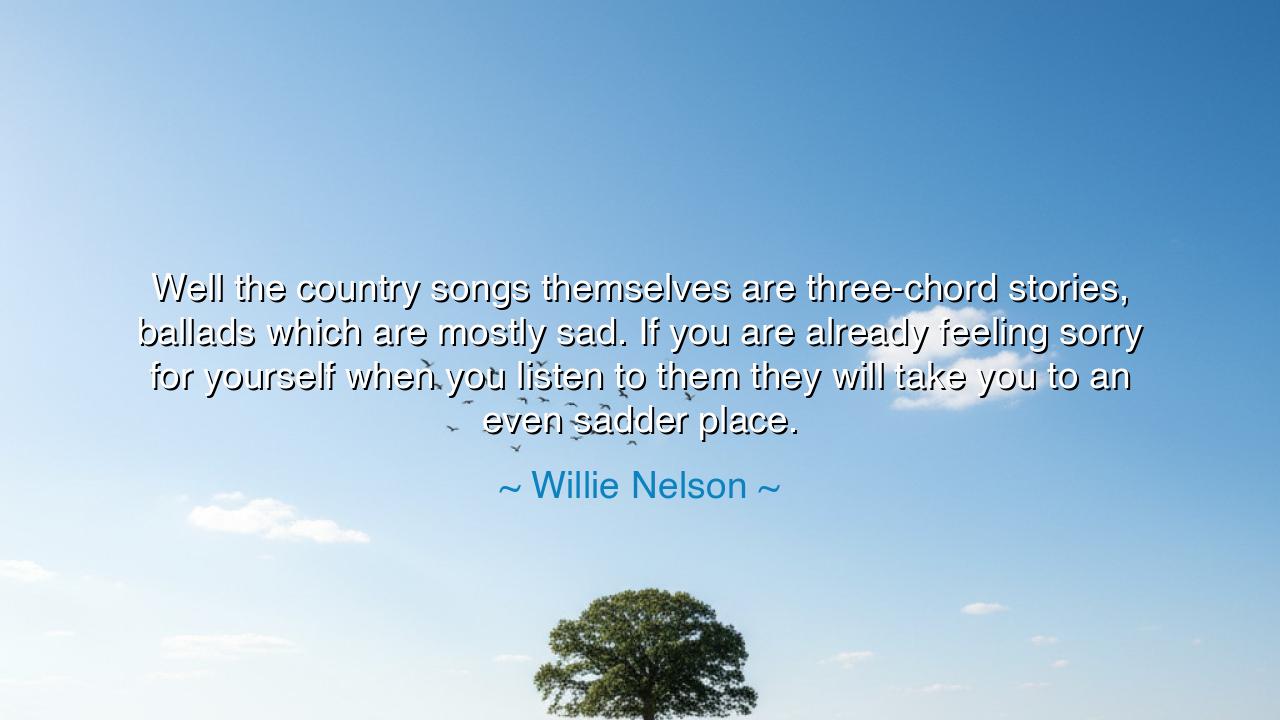
Well the country songs themselves are three-chord stories
Well the country songs themselves are three-chord stories, ballads which are mostly sad. If you are already feeling sorry for yourself when you listen to them they will take you to an even sadder place.






There are songs that do not merely entertain—they lead the heart into the hidden chambers of sorrow. Willie Nelson, reflecting on the nature of country music, once said, “Well the country songs themselves are three-chord stories, ballads which are mostly sad. If you are already feeling sorry for yourself when you listen to them they will take you to an even sadder place.” In these words lies the profound recognition that music is both mirror and guide: it reflects our inner state, yet it also has the power to deepen our emotions. Nelson reminds us that art does not merely accompany life; it shapes it.
The simplicity of the three-chord structure is deceptive, for within its apparent modesty lies the power to evoke deep feeling. Country ballads, with their straightforward melodies and plainspoken lyrics, strip away artifice, laying bare the human experience. They speak of love, loss, betrayal, and longing—the elemental stories of existence. When one listens already burdened with sadness, the music amplifies the emotional resonance, transporting the soul to a more profound understanding of grief and reflection. Nelson observes not only the mechanics of music but its psychological and spiritual impact.
Throughout history, cultures have used music to reflect the sorrows and struggles of life. In ancient Greece, laments were sung at funerals and festivals, not simply to mourn, but to guide the community through grief. The same can be said of the African griots, whose ballads chronicled loss, exile, and resilience. Country music, in its essence, continues this ancient function: it recounts the ordinary tragedies of life, allowing listeners to confront pain in a structured and communal form. To feel sadness in response is not weakness, but a natural and cathartic human response.
Nelson’s words carry a cautionary wisdom: music is a companion, not a cure. He warns that if one is already steeped in self-pity or sorrow, these ballads may magnify that melancholy. Yet within this warning lies an acknowledgment of the power of emotional honesty. Country songs do not flatter; they do not provide illusion. They echo the experiences of heartache and resilience, reflecting a truth that many of life’s more complex joys and sorrows cannot convey. In doing so, they offer a mirror for self-awareness and reflection.
Consider the story of Johnny Cash, whose music often chronicled despair, addiction, and regret. Songs such as Hurt or Folsom Prison Blues are imbued with sadness, yet they resonate because Cash sings not to lament endlessly, but to illuminate human vulnerability and endurance. Listeners who approach these songs consciously—aware of their emotional state—may find clarity, empathy, and even hope in the recognition that suffering is universal and acknowledged. This is the paradox Nelson articulates: sadness, when mediated through art, can be both deepening and enlightening.
There is also a lesson in moderation and self-awareness. Just as one would not walk into a storm unprepared, one should approach deeply melancholic music with an understanding of one’s current emotional landscape. Nelson’s observation teaches that while music can open the heart, it can also amplify existing distress. To engage with such songs wisely is to recognize the responsibility inherent in consuming art: we allow ourselves to feel, but we must also cultivate the awareness to step back when the journey becomes overwhelming.
From Nelson’s reflection, we learn that music is both a reflection and a teacher. It mirrors the depths of human sorrow while simultaneously guiding listeners toward empathy, contemplation, and emotional literacy. By understanding the power of country ballads—or any art that evokes sadness—we recognize that engagement with human experience is not always comfortable, but it is necessary for growth and understanding.
Thus, let his words guide us in life and in art: approach deeply emotional works with mindfulness, honor the feelings they awaken, and allow yourself to inhabit the stories they tell. At the same time, cultivate balance, ensuring that sorrow does not consume, but rather informs, enriches, and teaches. In this way, we can listen not merely to music, but to life itself, learning to navigate the depths of sadness while emerging with greater compassion, awareness, and resilience.






AAdministratorAdministrator
Welcome, honored guests. Please leave a comment, we will respond soon